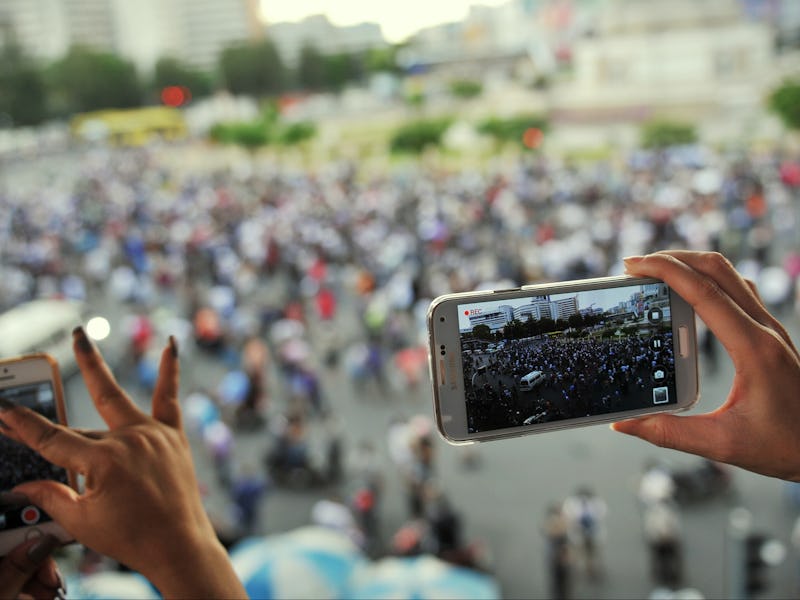How to Use Facebook Live to Be an Empowered Citizen in 2017
Speak truth to power.

Facebook Live was initially marketed as a way for public figures to broadcast their lives. Celebrities would share glimpses of their glittering lives, politicians would make promises, and the media would livestream important events. But the tool became so much more. Almost a year after its debut, Facebook Live is a vital tool for social justice because it levels the playing field in a way that nothing like it before has. Essentially, it holds people accountable.
That’s why it was used to broadcast the immediate aftermath of the deaths of Philando Castile and Alfred Olango at the hands of police. Or, to share information from protests at the Dakota Access Pipeline, even after Democracy Now! host Amy Goodman had an arrest warrant put out for reporting on that same movement. Facebook Live is the future of news; it just has to be used safely and properly. Here’s how to use the tool to speak truth to power.
The next time you find yourself on a desktop computer, visit facebook.com/livemap for a real-time, global view of who’s using Facebook Live. An attempted coup in Turkey in July offered multiple points of view from the chaotic streets.
Here’s how to most effectively use Facebook Live:
Learn your rights.
Each state decides its own recording laws. This means that you should brush up on the rules in your area before you start broadcasting with Facebook Live. Living in a one-party state like New York, where only one person involved in a recording has to give their consent, offers more legal footing than a two-party state like California. This is important if you plan to record conversations on private property that involve someone who isn’t a public figure of some kind.
You should also know that police can’t ask you to give up your phone without a warrant, nor can they destroy a video on your phone. The American Civil Liberties Union recommends being polite, asking if you are being detained, and reminding officers of your constitutional right to record in public if you are stopped by police.
Know your limits.
Don’t break the law in your efforts to share something with the world. You’re allowed to record in public areas, for example, just don’t trespass or get in the way of police while you’re doing so. Stepping onto somebody else’s property without permission is almost always illegal, regardless of your intent, and the courts are split on whether people can record police.
Still, legality does not always guarantee safety. Even if you live somewhere that supports citizens recording police officers, for example, it probably isn’t a good idea to antagonize someone who can use lethal force. And recording someone else — a hurtful teacher, abusive spouse, etc. — could also have consequences. Facebook Live is a video streaming tool, not a defense against violence.
Have someone else record a backup.
Don’t entrust Facebook Live with everything. Facebook can and has removed videos from its service, often because its automated filters decided they weren’t appropriate for the social network. Many of these videos are later restored, but until Facebook is held more accountable for its role in spreading information, you shouldn’t put all of your social justice eggs into such a rickety basket.
Also know that police can have streams interrupted. That’s what happened when Korryn Gaines used Facebook Live to broadcast a standoff with law enforcement. The police said people commenting on the video were encouraging Gaines not to listen to them, so they contacted Facebook, which suspended Gaines’s account to interrupt her video stream.
Prepare for scrutiny.
Facebook Live is powerful because it lets people watch an event as it unfolds. But the tool can’t be used anonymously, much like Facebook as a whole, which means sharing a popular video can lead to unwanted attention. People who stream important news are often contacted by journalists, members of their community, and online randoms who all want to gather more information.
This attention can be useful. It helps keep things in the news and draws attention to whatever was caught on camera. But if you aren’t ready for that scrutiny, or fear that sharing a video on Facebook Live might put you in some kind of danger, it’s worth thinking twice about live-streaming something. The tool was made for celebrities, and its users can accidentally become them.
Be bold.
If you are ready to continue, though, go ahead and let the world see through your eyes. Record the police officer abusing their power. Let the world see what’s happening to peaceful protestors. If you have a smartphone, an internet connection, and a Facebook account, you have everything to need to share your truth. Just push record and let Facebook Live (and its users) handle the rest.